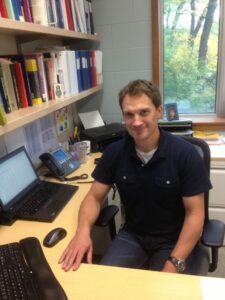 Dr. Josh Lawson (Faculty, Canadian Centre for Health and Safety in Agriculture) describes how a Division of Social Accountability Global Health Travel Award helped him research Childhood Asthma in Poland.
Dr. Josh Lawson (Faculty, Canadian Centre for Health and Safety in Agriculture) describes how a Division of Social Accountability Global Health Travel Award helped him research Childhood Asthma in Poland.
This past spring your research into childhood asthma brought you to Poland. Why Poland?
My original involvement with this research and education program started about 7-8 years ago. The project lead, Jan Zejda, completed a post-doc in Saskatoon at the Centre for Agricultural Medicine (now CCHSA) in 1989-91. Following this work, he went back to Poland and built an incredible career based on both clinical and academic work. In the 2000s, he started the Department of Epidemiology at the Medical University of Silesia. As part of this he wanted to establish a strong research program and use CCHSA as a bit of a model. In about 2008-9 he was bringing together colleagues from Belarus and Ukraine to investigate childhood asthma in the region. In order to build research capacity and aid in the investigation, he went back to CCHSA to ask for some support. Dr. Donna Rennie and I were invited to participate in the research program as advisors so we visited Poland to meet the team and see what we could do to help.
How did immersing yourself in a new culture have an impact on your research?
It has been a learning experience that has allowed me to watch and learn how asthma is thought of and approached and to see similarities with what was happening in Canada several years ago. In addition, it has allowed me to have a much larger understanding of the political, economic and clinical factors that affect asthma. It has become clear that differences in asthma prevalence and morbidity go beyond environmental reasons. We have learned a lot and brought some of the ideas and things we have learned home to investigate in a Canadian setting. Traveling and interacting with these other scientists help shape our ideas and stimulate research questions or direction.
What was it like to learn and work with your Polish Colleagues?
It has been an outstanding experience. We have been able to develop strong professional ties but have also become close friends. We keep in communication often about potential research and providing assistance but also advice personally. This has occurred with several colleagues from within our international network. In my career, the thing that has helped me most is having incredible mentors. Watching and working with my colleagues in a region where there is a lot of political difference and seeing how this is negotiated has been very educational. It has also allowed me to see the problems that occur in countries with little research capacity or funding. It has also allowed me to see some of the similarities and how good science knows no borders.
What were some of the most striking things you took away from that experience?
Specific to the research program, I was amazed at the amount of potential asthma under-diagnosis and some of the reasons why, which were partly based on traditional labeling practices within the region as well as some political or system reasons. Learning about these issues has influenced some of the research we have conducted in Saskatchewan as we look at reasons other than environmental to explain geographic differences in asthma prevalence. From a more personal perspective, it was very interesting to see some of the differences in culture and lifestyle, especially from an academic perspective and the differences in the expectations, system, and ability to conduct research.
Why should people either students, residents, faculty or staff consider applying for a Global Health Travel Award?
I believe that experience is the key to learning and development whether it is personal or career focused. This includes working with people from different regions and perspectives. The international experience can open your eyes through experiences that you would not be able to have at home. Whether the program is research, education, clinical, etc., at minimum the participant will walk away with an adjusted or new perspective. These experiences may also alter a person’s career path or focus. While the person completing the travel will be able to learn and develop, hopefully most of these experiences allow that person to have a positive impact on the group or community in which they are working as well.
The Spring Global Health Travel Award Deadline is March 15th, 2018!
Come to our First Annual Global Health Networking Event on March 7th 2018.
EVERYONE IS WELCOME!
For more information and to apply visit:
Global Health Travel Awards 2018

